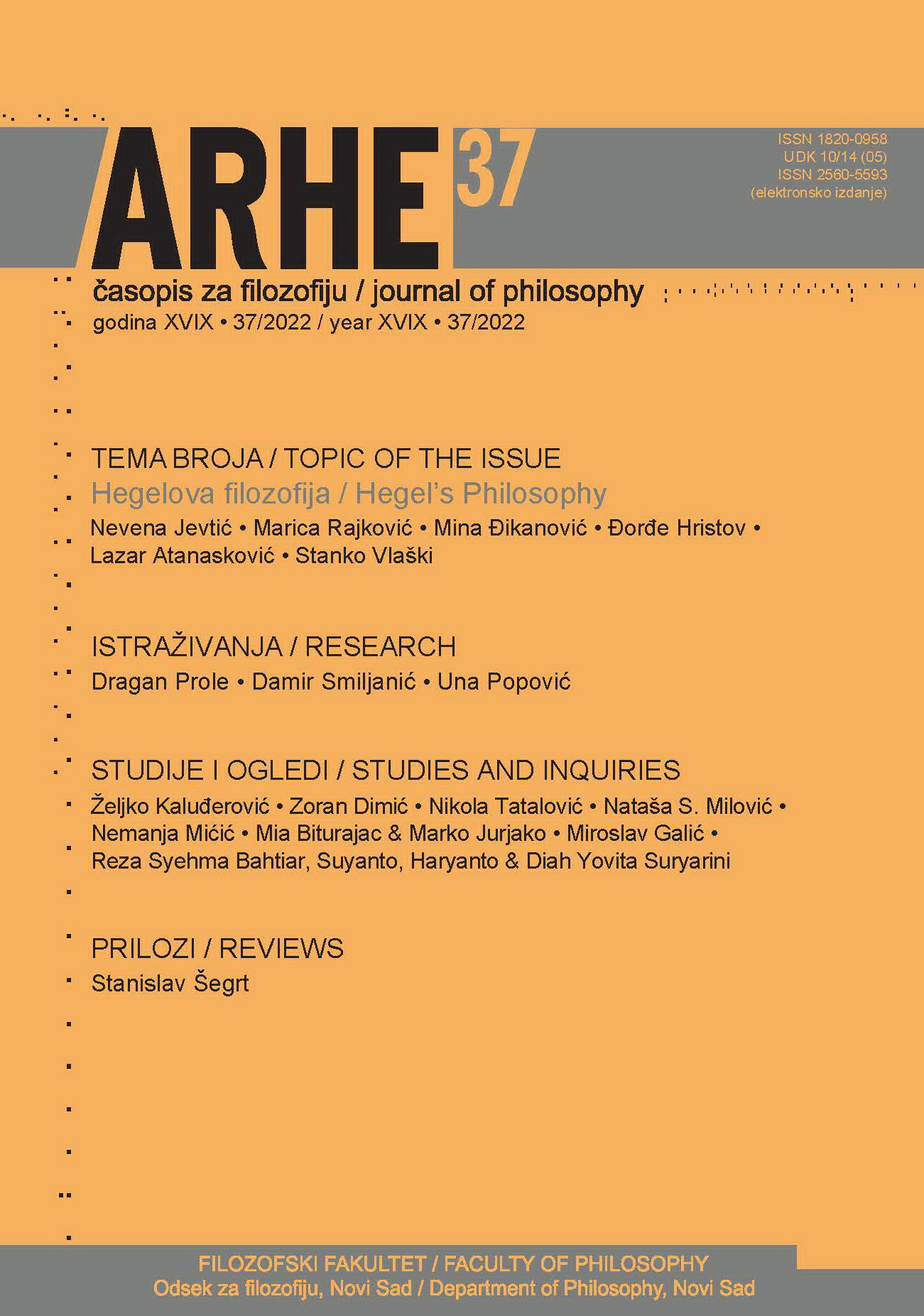METAFIZIČKI I METODOLOŠKI NATURALIZAM U RASPRAVAMA O MOGUĆNOSTI EVOLUCIONE PSIHOLOGIJE
Glavni sadržaj članka
Apstrakt
U radu ćemo se baviti trajućom debatom između pobornika i protivnika evolucione psihologije, odnosno, pokušaćemo da sažmemo glavne argumente obiju strana, da bismo polučili određene filozofsko-metodološke zaključke o njenim prednostima i nedostacima. Pored razmatranja unutrašnjih argumenata i rasprava unutar psihologije same, cilj nam je razmotriti problem evolucionog pristupa naučnom razumijevanju razvoja ljudske psihe sa stanovišta metafizičkog i metodološkog naturalizma. Metafizički naturalizam bi implicirao postojanje nepromjenjivih i trajnih prirodnih istina koje su nam dostupne kroz naučni metod, dok se pristup metodološkog naturalizma ne bi obavezivao na metafizičku nužnost istinitosti naturalizma samog, već bi ga usvajao kao hipotezu. Naime, bitan dio rasprava o vrijednosti evolucione psihologije zasniva se na tome da li se psihičkim adaptacijama pristupa kao nečemu što je uglavnom završeno i utvrđeno („mozak iz kamenog doba“) te ih je potrebno razumijevati u situaciji nove okoline, ili im se pristupa kao nečemu što je konstantno u razvoju i procesu adaptiranja kulturnim, a ne strogo biološkim faktorima. U tom svjetlu, postavlja se pitanje o filozofsko-metodološkim temeljima ovakvih naučnih pristupa unutar psihologije.
Detalji članka

Ovaj rad je pod Creative Commons Autorstvo-Bez prerada 4.0 Internacionalna licenca.
Reference
Abramson, A., „Our brains are stuck in the Stone Age: How ‘evolutionary mismatch’ affects our weight, behavior, and overall health“, Elemental. 2020, February 25, https://elemental.medium.com/our-brains-are-stuck-in-the-stone-age-13bb5d2aea36
Bolhuis, J. J., Brown, G. R., Richardson, R. C., & Laland, K. N., „Darwin in mind: New opportunities for evolutionary psychology“, PloS Biology, Vol. 9, No. 7 (2011), str. 1-8. https://doi.org/10.1371/journal.pbio.1001109
Buller, D. J., Adapting minds: Evolutionary psychology and the persistent quest for human nature, The MIT Press, Cambridge (Mass., USA) 2005.
Buller, D. J., „Four fallacies of pop evolutionary psychology“, Scientific American, Vol. 22, No. 1s (2012), str. 44–51.
Confer, J. C., Easton, J. A., Fleischman, D. S., Goetz, C. D., Lewis, D. M. G., Perilloux, C., & Buss, D. M., „Evolutionary psychology: Controversies, questions, prospects, and limitations“, American Psychologist, Vol. 65, No. 2 (2010), str. 110–126. https://doi.org/10.1037/a0018413
Cosmides, L. & Tooby, J., Evolutionary Psychology: A Primer. Center for Evolutionary Psychology, University of Santa Barbara, 1997, https://www.cep.ucsb.edu/primer.html
Darwin, Ch., On the origin of species, Oxford, Oxford University Press 2008.
Gannon, L., „A critique of evolutionary psychology“, Psychology, Evolution & Gender, Vol. 4, No. 2 (2002), str. 173–218. https://doi.org/10.1080/1461666031000063665
Hagen, E. H., „Controversial issues in evolutionary psychology“, u The Handbook of Evolutionary Psychology (priredio David Buss), Wiley, Hoboken (NJ, USA), str. 145-174.
Harmon, K., „Fast-evolving brains helped humans out of the Stone Age“, Scientific American, 2011, https://www.scientificamerican.com/article/evolutionary-psychology-brain-changes/
Henrich, J., The WEIRDest people in the world: How the West became psychologically peculiar and particulary prosperous. Farrar, Straus and Giroux, New York 2020. [E-book]
Honda, K., „A critique of evolutionary psychology“, Psychology in Seattle, 2014. https://www.psychologyinseattle.com/a-critique-of-evolutionary-psychology
Lloyd, E. A., „Evolutionary psychology: The burdens of proof“, Biology and Philosophy, Vol. 14 (1999), str. 211–233.
Marks, J., „Evolutionary psychology is neither“, This View Of Life, 2015, https://thisviewoflife.com/evolutionary-psychology-is-neither/
Minkel, J. R., „Psyching out evolutionary psychology: Interview with David J. Buller“, Scientific American, 2005.
https://www.scientificamerican.com/article/psyching-out-evolutionary/
Prum, R. O. & Brush, A. H., „The Evolutionary Origin and Diversification of Feathers“. Quarterly Review of Biology, Vol. 77 (2002), str. 261–295.
Richardson, R. C., Evolutionary Psychology as Maladapted Psychology, The MIT Press, Cambridge (Mass., USA) 2007.
Saad, G., „Applying evolutionary psychology in understanding the Darwinian roots of consumption phenomena“, Managerial and Decision Economics, Vol. 27 (2006), str. 189–201. https://doi.org/10.1002/mde.1292
Sober, E., Philosophy of Biology, Vestview Press, Boulder (Co., USA) 2000.
Smith, S. E. (2020). „Is evolutionary psychology possible?“. Biological Theory, Vol. 15, No. 1 (2020), https://doi.org/10.1007/s13752-019-00336-4
